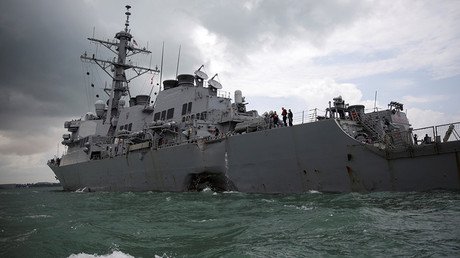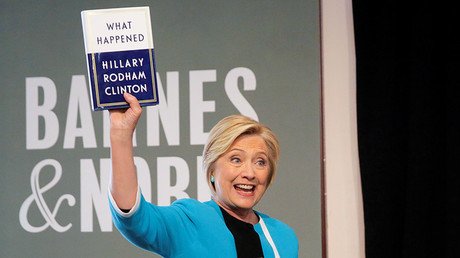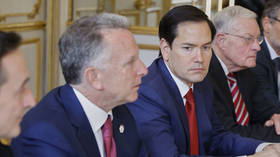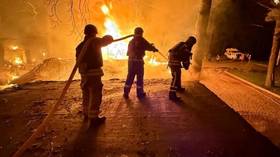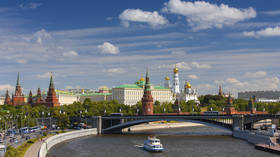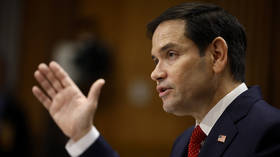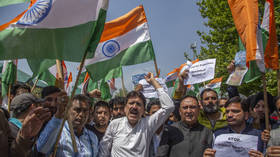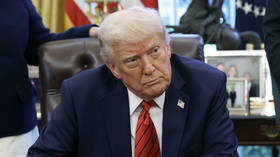Showdown in Syria: The reason Russia (not China) is the target of Washington's wrath
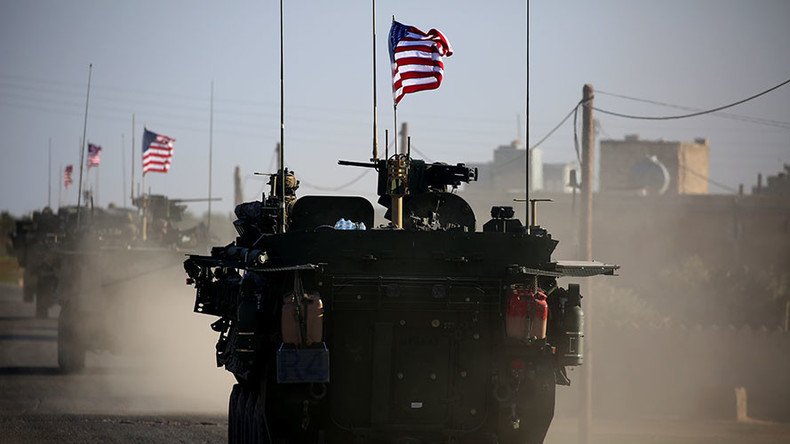
US vilification of Russia began in earnest shortly after Moscow opened a military offensive against Islamic State forces in Syria, where the loathsome terrorist group, when not brandishing arms, was also running a profitable oil export business.
Last year, Russia, without rhyme or reason, was accused of interfering in the US presidential election in order to help Donald Trump defeat Hillary Clinton. Yet there were other equally qualified states, particularly China, that could have been equally dragged through the American mud, slandered without a shred of evidence against them for such a brazen act. However, Washington wants the world to believe Russia was responsible for such folly, and the reason for that is obvious - Syria, and more specifically, Russia's stunning success there. And what we know in the aftermath of the USS McCain wreck confirms that.
Dire straits
On August 21, the destroyer USS John S. McCain, named after the grandfather and father of Senator John McCain, suffered a major fender bender with a cargo ship off the coast of Singapore, resulting in the death of ten US sailors. If that was not embarrassing enough for the world's mightiest naval force, it marked the fourth collision of a US Navy vessel this year. On June 17, the USS Fitzgerald was also involved in a fatal accident when it crashed into a container ship, leaving seven US sailors dead.
Perhaps it is no surprise that all four collisions occurred in the 'Pacific Theater,' near China, which has watched with traditional Chinese reticence as the US creeps along with its so-called "pivot to Asia." This massive rebalancing of US military forces to Asia began with great fanfare under the Obama administration (many observers, however, are of the mind the Asian-obsessed policy, which took Washington's eye off the ball in the Middle East and elsewhere, will go down as "Obama’s greatest foreign policy mistake").
Writing in Foreign Policy journal in 2011, then Secretary of State Hillary Clinton described the "rebalancing" of US diplomatic and military forces in China's backyard as "forging a broad-based military presence" as well as "advancing democracy and human rights." Clinton placed the proverbial cherry on top of the mud pie when she rather dishonestly declared, "We are the only power with a network of strong alliances in the region, no territorial ambitions, and a long record of providing for the common good."
Few Chinese, I imagine, could have read those lines without sitting straight-up and spilling their tea.
Back to the mystery of the US naval collisions. Given the surge of anti-Russia hysteria and hostility that has come to dominate the American psyche ever since Hillary Clinton's fabulous flame-out against the mighty Trump, it is no surprise Russia would appear in the lineup of usual suspects in the USS McCain accident. What is surprising, however, is that other suspects, notably China, are also being given due consideration as well. This should tell us a lot, and it does.
"While accidents and mistakes do happen, the number of collisions in the past year is extremely rare, and it is now within the realm of possibility that these accidents were not accidents," Omaid Faizyar wrote in RealClear Defense, a website dedicated to military issues. "Both China and Russia have tested their cyber-warfare capabilities at sea with success."
Indeed, to say China has come to master the subtle art of cyber kung fu would be a considerable understatement. In September 2016, Paul Martini presented a list of just some of China's alleged cyber achievements: "A massive distributed denial of service (DDoS) attack knocked offline at least 68 Philippine government websites in July, apparently in response to an international court ruling that denied China’s territorial claims in the region. Just days later, Vietnam's national airline and major airports were targeted in a series of attacks by the Chinese hacking group 1937CN."
The report also mentioned how the Chinese "attempted to interfere with US military drones at least once in recent years," and "shown willingness to use GPS jamming to prevent US aircraft from conducting surveillance missions in the Spratly Islands."
Do you see where this is leading? Yes, straight to the 2016 US presidential election.
Three American lies destroying the US-Russia relationship (Op-Ed by Robert Bridge) https://t.co/muOt6ToPCnpic.twitter.com/SQQyEreS77
— RT (@RT_com) August 9, 2017
The politics of regime change
Considering the US was fully aware the Chinese were capable of carrying out highly sophisticated cyber-attacks, why wasn't Beijing also a top suspect for hacking the 2016 US elections? Why was Russia the only suspect standing against the wall in the police lineup? After all, not only did the Chinese have the motive (the Democratic contender Hillary Clinton, remember, was an avid supporter of Obama's "pivot to Asia," which was - and still is - seen as extremely threatening to the Chinese), they certainly had the means and opportunity.
Think about it. If China possesses the cyber prowess to hijack a US military drone, or even steer a US warship off course, causing it to actually crash, then - hypothetically speaking, at least from Washington's point of view - hacking the computers of the Democratic National Committee (DNC) would have been a walk in the park, and even more so since Hillary Clinton was known to have sent sensitive documents over her unguarded personal home computer. In fact, it certainly did not require any state agency for WikiLeaks to acquire the DNC emails, which revealed a lot of unsavory things about the campaign, including that she was fed questions for the debates.
As Trump memorably commented during a presidential debate against Clinton: “I don’t think anybody knows it was Russia that broke into the DNC,” Trump said. “She keeps saying ‘Russia, Russia, Russia,’ and maybe it was. It could be Russia, but it could be China, could also be lots of other people. It could be someone sitting on their bed that weighs 400 pounds."
At this point, we must point out what the Western mainstream media never will: no definitive, concrete evidence has ever been produced to demonstrate Russia was responsible for hacking the DNC, thus sending US-Russian relations, not to mention the Trump presidency, straight to hell in a handbasket.
Instead, the public must be willing to swallow zero-calorie statements that Washington officials regurgitate, like "We are confident that the Russian Government directed the recent compromises of emails from US persons and institutions, including from US political organizations.” Yet, when we are speaking about the relations between two of the world's premier nuclear powers, we must be much more than just "confident." Physical proof must be presented, but to date, there has been none.
So now the question comes down to 'why'? Why did the US opt to single out Russia as the culprit in this grand fiasco when other powers, not least of all China, also had the hypothetical ability to hack the US elections in favor of Donald Trump? (It needs to be emphasized that "ability" does not equal "willingness," of course, and considering how Donald Trump seems to have turned out to be the worst nightmare for both Russia and China, working behind the scenes as campaign boosters on his behalf would clearly not have been in their best interests).
The reason is obvious. The unbridled level of US hostility toward Russia has nothing to do with the 2016 elections, but everything to do with an embattled Arab country called Syria. Russia began its military intervention in the Syrian conflict in September 2015 after an official request by the Syrian government for military aid against Islamic State. It speaks volumes about Washington's real agenda in Syria, which is yet another regime change operation, this time against Syrian President Bashar Assad, that it never attempted to cooperate with Russian military efforts in Syria. In fact, it tried to impede them at every opportunity. In June 2016, for example, when Russian Defense Ministry requested Washington provide Moscow with the coordinates of areas controlled by the US-backed Syrian opposition to avoid any unintended consequences, Washington inexplicably refused, risking a disastrous mishap.
While the Russian military was effectively liberating terrorist strongholds, like Palmyra and Aleppo, US criticism against Russian efforts seldom took a pause. However, the joyous celebrations followed the liberation of these ISIS strongholds vindicated Russia for its actions.
Meanwhile, the source of the problem, which is still very much the elephant in the room, is that the US seems willing, once again, to take its chances by removing an elected leader from office thereby creating a power vacuum, which in all likelihood will be filled by far worse alternatives, perhaps even terrorists. Think Libya. Think Iraq. Russia, however, is adamantly opposed to such interference in the affairs of yet another foreign sovereign state.
As all of this was coming to a boil in Syria, the US campaign between Clinton and Trump was also heating up. And the stakes were as high as ever. The Clinton camp represented a continuation of neocon foreign policy, which remained largely unchanged and very unhinged from the days of 'war president' George W. Bush to that of 'peace president' Barack Obama. Trump, at least on the campaign trail, promised to end US conflicts, going so far as to suggest walking away from the North Atlantic Treaty Organization (NATO).
And when it became painfully apparent that Hillary Clinton would not carry the day for the military-industrial complex, a convenient scapegoat was needed. After all, who could believe that any American would willfully vote to end exorbitant military misadventures abroad in favor of 'Make America Great Again'?
Although the scapegoat for Clinton's epic loss could just as easily had been China, a faction of the US government, the Deep State, the proverbial Swamp, pointed the heavy finger of blame at the one country - Russia - that has dared challenge Washington's regime change tradition in Syria.
Had China decided to support Syria's desperate efforts in defeating the terrorists, as well as maintaining Assad's grip on power against regime change fanatics, Washington would have nominated another bogeyman, named Beijing.
The statements, views and opinions expressed in this column are solely those of the author and do not necessarily represent those of RT.

